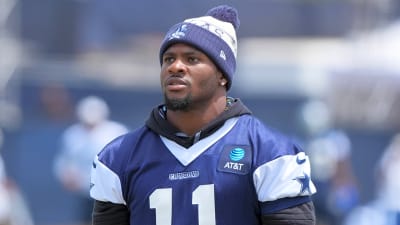If anything looked weird at Arkansas' first fall camp Friday, it was the box located on quarterback Taylen Green's helmet.
It was a black, bug-eyed virtual reality camera fastened to his helmet. More than just a gadget, the device streamed Green’s every move in practice, offering an unprecedented look at the Razorbacks’ offense through the eyes of its leader.
As the Hogs’ redshirt senior dropped back to throw, the VR camera tracked defensive alignments, Green’s sight lines, and the split-second decisions that determine wins or losses. Each step was captured, soon to be uploaded into a virtual reality program designed to help quarterbacks process game situations off the field.
It's a project Arkansas coach Sam Pittman described as “a 30, maybe 45-minute learning session where it’s virtual, and they can see the field off of practice tape and off of game tape.”
"Taylen went somewhere and saw it and used, saw it being used," Pittman said after practice. "Came back and asked, 'Could we get it?' So I went and if it's going to help us win, yes. But I'm not to say so. The man, he's sitting right there, he okayed it a long time ago. Wasn't very much money ..."
Athletics director Hunter Yurachek was in the presser and interjected, "relatively speaking."
The Razorbacks are banking on that edge. After back-to-back 7-6 seasons, Pittman needs anything he can get his hands on. He's even willing to wear it.
"It was way before anything happened, but it's not that expensive," Pittman said. "We think, Bobby [Petrino] thinks, Taylen thinks, Grayson [Wilson] thinks, that it's going to be a major help for them. The people selling it think it is as well, but I haven't. I played quarterback in seventh grade. I haven't put it on yet. Went from right guard sixth grade to seventh grade QB, baby. I haven't put it on, but I might."
The VR camera initiative, Pittman explained, is about closing the gap between the classroom and the chaos of the pocket.
“We want our quarterbacks to see things before they happen," Pittman said. "With this, they can relive practice, see what they missed, and get better without taking hits.”
Friday’s practice unfolded like most first days. Pass routes were crisp, tempers occasionally flared, and the staff kept a close eye on the offensive line, which returns several starters, but still gave the coaches chances to yell.
But the tech drew the most attention. Green’s helmet rig fed live video into a VR system, allowing backup quarterbacks and coaches to experience each snap in immersive detail.
The Razorbacks are not the first football team to test VR, but few have gone as far as mounting a live camera on their starting quarterback during a full-speed SEC practice.
Teams like Stanford and Clemson have experimented with VR for playbook learning, but Arkansas’ approach is more direct, aiming to capture the game’s physical and mental demands in real time.
The Razorbacks’ embrace of technology comes as the program looks to rebound from a challenging stretch. The 2024 season saw Green lead the team with flashes of brilliance and moments of inconsistency.
The VR camera’s debut is part of a broader push at Arkansas to embrace analytics, sports science, and new technology. Off the field, the staff has invested in GPS tracking, sleep monitoring and advanced nutrition.
It's all in pursuit of a small advantage in a conference where every edge matters.
“Football’s still football,” Pittman said. “But if you’re not evolving, you’re falling behind.”
Right now, the Razorbacks aren't in a position where they can fall behind much more. Camp practices will continue with a practice in the morning followed by press conference with tight ends coach Morgan Turner and some of his players.
Hogs Feed:
More must-reads:
- 15 schools that can throw a wrench in the College Football Playoff
- Troubling update emerges about Joel Embiid’s health
- The 'NFL mascot names' quiz
Breaking News
Trending News
Customize Your Newsletter
 +
+
Get the latest news and rumors, customized to your favorite sports and teams. Emailed daily. Always free!








